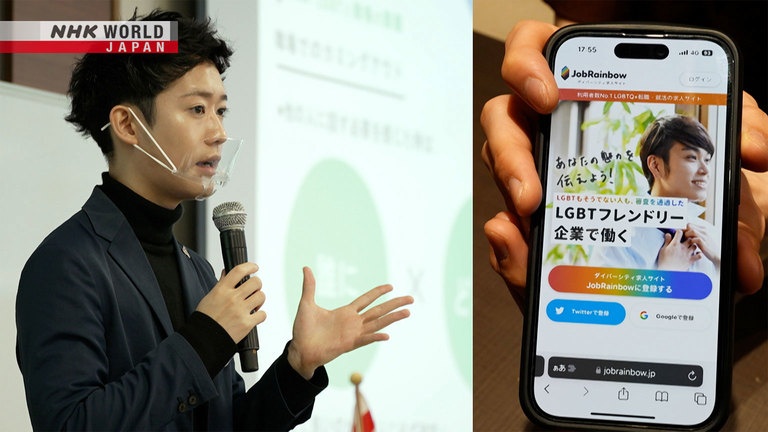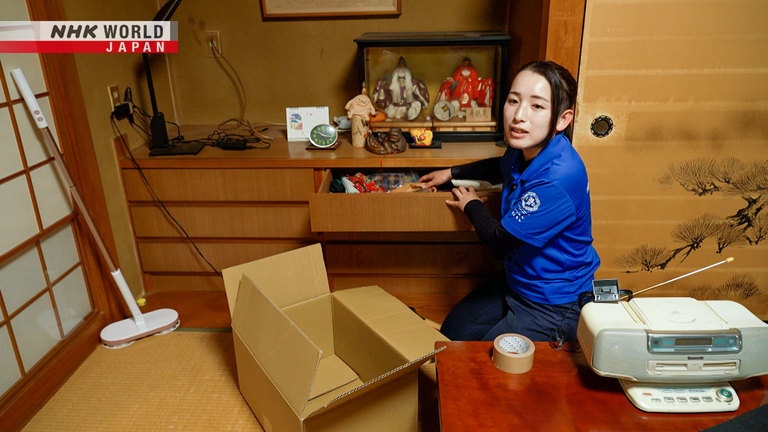Seeking Equality for Sexual Minorities
[SPECIAL EDITION]
This series includes selected stories from BIZ STREAM's signature "On-Site" reports. Whether it's discrimination during the hiring process or issues that arise after hiring, sexual minorities in Japan face a range of challenges when it comes to finding stable employment. This report features companies that are striving to even the playing field by offering people the chance to succeed regardless of their sexual orientation.
*Subtitles and transcripts are available for video segments when viewed on our website.
Seeking Equality for Sexual Minorities


Transcript
A job search site made specifically for LGBTQ+ people
is helping sexual minorities find workplaces they can feel comfortable in.
And this company found that the key to profitability lies in a diverse workforce.
Today's On-Site Report features businesses focused on promoting equality for sexual minorities in the workplace.
Shimizu Alice works for a major restaurant chain that has over 600 branches in Japan and abroad.
Previously, Shimizu worked at a hotel where she was required to wear a men's suit due to her assigned gender.
But she wanted to work for a company that didn't have a gender-specific dress code.
It was difficult to find decent paying jobs with flexible
dress codes that let me express my femininity.
In order to find a job that gave her the freedom she wanted, Shimizu used Job Rainbow,
a job search website designed specifically for sexual minorities.
The site currently boasts 531 registered companies.
Using a variety of search parameters, such as flexibility on hair and clothing choices,
job seekers can search for companies that offer an ideal work environment.
The site now averages about 650,000 active users per month.
Job Rainbow was founded in 2016 by Hoshi Kento.
He was inspired to create the service after a friend from university was turned down for a position
after explaining that she was transgender during a job interview.
They told her, "We don't have anyone like you
in our company, so we can't hire you."
I was so angry because the decision had nothing
to do with actual ability.
That is why I started my company.
I wanted to give sexual minorities
an equal place to start from.
From the beginning, Job Rainbow has made sure that any companies wishing to be listed on their site
let them conduct a detailed check to see how LGBTQ+ friendly they are.
The 100-point checklist contains a wide range of criteria, such as whether or not a company has
a clear anti-discrimination policy and whether or not they recognize same-sex relationships.
This check was instituted to prevent users from being matched with companies
that wouldn't be able to provide them with a comfortable environment to work in.
Despite its current success, Job Rainbow didn't have a single company register with it within its first 2 years.
Hoshi, who is gay himself, was appalled at the resistance he faced.
Even major manufacturers with over 100,000 employees
would say "No, we don't have any LGBTQ staff here."
However, things began to change in recent years as municipal governments across Japan gradually began to recognize same-sex partnerships.
In 2019, Hoshi organized a job fair with about 20 different large companies.
The event received a lot of attention because it allowed job hunters to hear directly from LGBTQ+ employees
who worked at the participating companies.
Events like this have helped Job Rainbow to become the largest job search service for sexual minorities in all of Japan.
Job Rainbow also provides advice to companies.
For example, the restaurant chain where Shimizu works used to use uniforms with different colors for male and female staff.
After consulting with Job Rainbow, however, it stopped that practice.
It also decided to add All-Gender Restrooms.
Over the last 5 years, it has opened 5 new chains, including a BBQ restaurant.
Annual sales have increased by over $2 million and the company believes that diversity has played a key role in its recent strong performance.
I think diversity broadens the range of opinions we can
consder when deciding which direction to head in.
We are fighting to change society and to
set things right for minorities.
I think this will also be extremely positive
for the Japanese economy.
Ushiba Mayu works as a truck driver for Ohashi Transportation.
She has long identified as pansexual - someone who can feel attracted to a person regardless of their sex or gender identity.
She has been in a relationship with a transgender person for over 8 years
and says the restaurant where she used to work wasn't accepting of sexual minorities.
At my last job, I would refer to my partner
as my boyfriend.
My supervisors would ask things like,
"Why don't you get married?"
But here, that's not an issue. I even felt comfortable when writing
my partner's name down as my emergency contact.
Ohashi Transportation has been committed to diversity since 2012.
In addition to sexual minorities, the company has also made it a point
to hire a range of new employees, including women and non-Japanese.
The reason for the shift in hiring practice - a major driver shortage had put the company in the red.
President Nabeshima Hiroyuki, believed that the company wouldn't be able to recover unless it could quickly grow its workforce.
Small businesses don't attract large numbers
of applicants like larger companies.
So, if we want to draw in a wide range of talent,
we need to embrace diversity.
Here's our company's job application form.
Nabeshima decided to drop the standard practice of asking applicants about gender.
He also changed the company's vacation policy to allow employees in same-sex relationships
to receive paid leave after submitting proof of partnership.
Although same-sex marriage still aren't legal here,
having a company that recognizes and supports
our relationship really gives me some peace of mind.
Since changing its stance on diversity 10 years ago, the company has gone from receiving about 40 job applications per year, to over 160.
Individual people create added value, so it's important
to hire quality employees.
Having a diverse staff also translates
to having a diverse clientele.
I think making these changes has really
helped us to grow and improve.
After resolving its driver shortage and returning to profitability,
the company then decided to expand by offering direct business to consumer services in 2014.
One such service is helping clients clear out and dispose of items from vacated or soon to be vacated homes.
On the day we visited, Ushiba was helping empty a house whose owners were leaving to stay in a nursing home.
She's tasked with cleaning out everything from tiny knick-knacks to large pieces of furniture.
Is it okay to throw away this fan?
The company's new businesses now account for 30% of its total sales and have helped it to become more profitable than ever.
I often work with people who are in
very difficult situations.
Most clients will say to me, "Thank you,
you were such a help!"
That's another reason why I love this job!